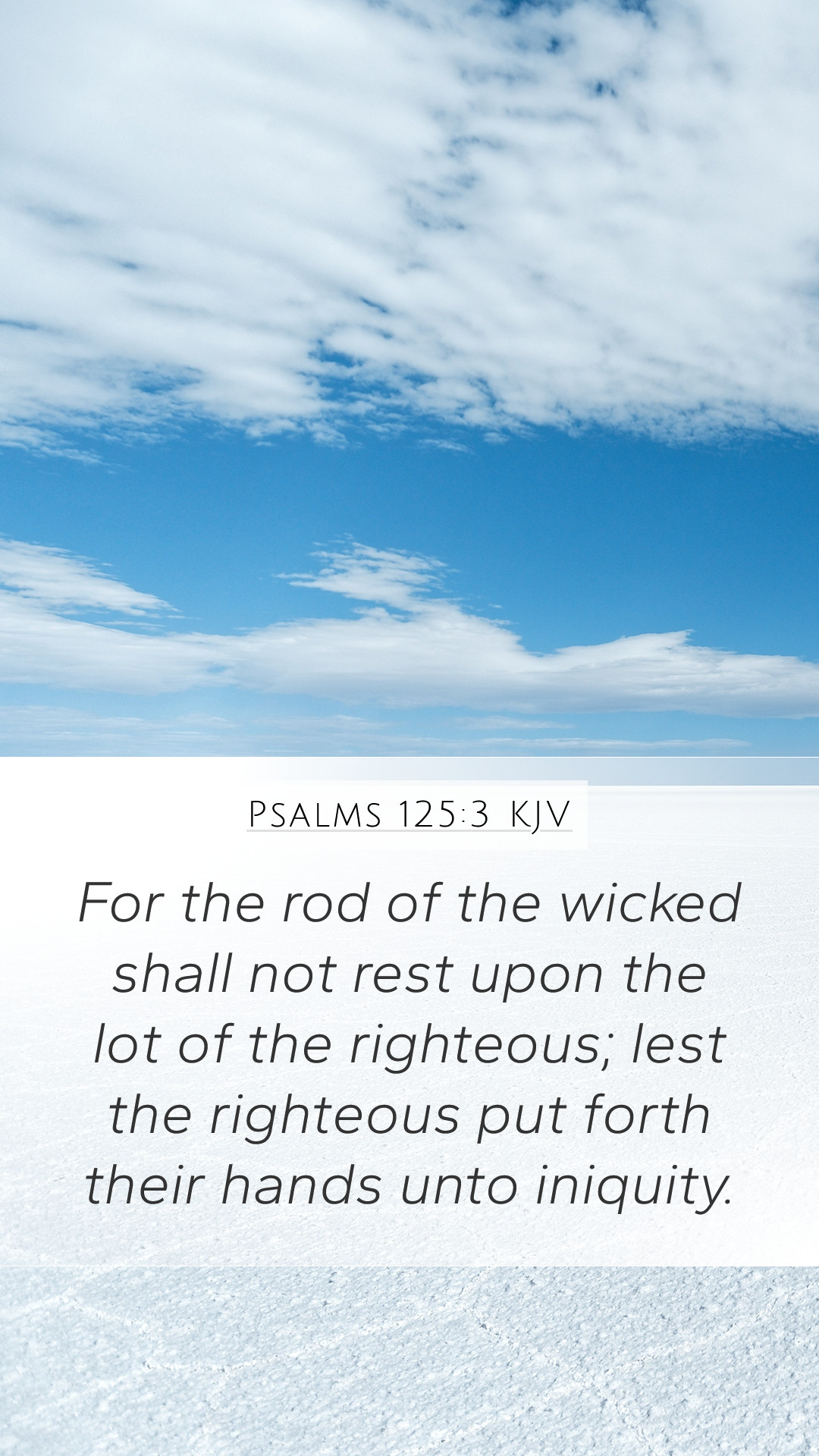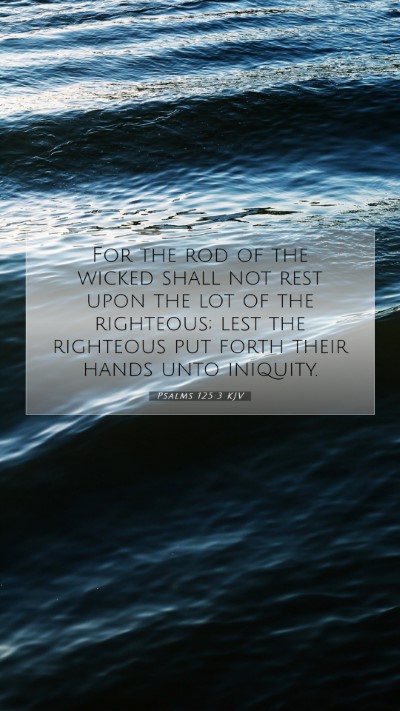Psalms 125:3 – A Deep Exegesis
Bible Verse: Psalms 125:3 (KJV) - "For the rod of the wicked shall not rest upon the lot of the righteous; lest the righteous put forth their hands unto iniquity."
The Book of Psalms, a collection of songs and prayers, often reflects the emotional and spiritual life of the faithful. Psalm 125 speaks to the assurance and security that the righteous feel under God's protection, emphasizing a crucial theological principle regarding divine justice and moral order.
Verse Interpretations from Public Domain Commentaries
Matthew Henry's Commentary
Henry elaborates on the theme of God's providential care for His people. He emphasizes that the "rod of the wicked" symbolizes oppression and adversity, which will not have lasting power over the "lot of the righteous." The righteous are those who trust in the Lord and follow His ways. This protection ensures that they do not turn to sin, as the overwhelming presence of evil would otherwise tempt them to respond with iniquity. Henry highlights the faithfulness of God, ensuring that His people remain steadfast amidst trials.
Albert Barnes' Notes on the Bible
Barnes discusses the implications of the verse in terms of justice. He notes that while the wicked may have temporary power or dominion, it will not persist or prevail against the righteous. The "lot" refers to the portion assigned by God, and Barnes assures readers that God's people will not be driven to sin due to the overwhelming influence of evil. He emphasizes that the verse provides a profound sense of hope, indicating that calamities faced by the faithful are temporary and will eventually pass away, leading to divine restoration.
Adam Clarke's Commentary
Clarke presents the verse with a focus on the temporal versus the eternal consequences faced by the righteous and the wicked. He points out that the rod signifies punishment or discipline, and while the righteous may face trials, they are not intended for their destruction but rather for their purification. Clarke also warns against the seduction of iniquity, suggesting that the primary danger lies in the hearts of the faithful, where doubt or despair may lead them to contemplate sin if they perceive God's favor has been withdrawn due to affliction.
Analysis and Understanding
This verse encapsulates a vital principle within the broader discourse of Scripture about faith, righteousness, and divine oversight. Here are some key insights:
- God's Sovereignty: The verse reassures believers of God's control over earthly affairs and that evil's reign is limited.
- Encouragement in Trials: Through this verse, the faithful are encouraged to remain steadfast, knowing that their struggles are under God's careful watch.
- Call to Righteousness: The implication is clear: the righteous should avoid sin, as it can lead to spiritual ruin, especially in times of trial.
- The Nature of Wickedness: The mention of the "rod of the wicked" serves as a reminder that evil agents may seek to exploit the faithful's vulnerabilities, but their efforts are bound by divine limits.
Application in Daily Life
Understanding Psalms 125:3 has profound implications for daily living and spiritual growth:
- Hope in Adversity: This verse can be a source of strength during difficult times, reminding believers that their struggles are not in vain and that God provides protection.
- Community Support: In Bible study groups, this verse can foster discussions about the faithfulness of God and encourage collective resilience against trials.
- Moral Integrity: The teachings invoke a call to maintain moral integrity amidst temptation, urging believers to lean on God's promises for strength against sin.
- Prayer and Reflection: This verse calls for prayerfully reflecting on one's life and choices, ensuring alignment with God's will and avoiding paths that lead into iniquity.
Related Bible Cross References
- Psalm 37:28 – "For the Lord loveth judgment, and forsaketh not his saints; they are preserved for ever: but the seed of the wicked shall be cut off."
- Proverbs 10:30 – "The righteous shall never be removed: but the wicked shall not inhabit the earth."
- Isaiah 54:17 – "No weapon that is formed against thee shall prosper; and every tongue that shall rise against thee in judgment thou shalt condemn."
Conclusion
In summary, Psalms 125:3 serves both as a comfort and a challenge to the righteousness of believers. Through the insights gained from various commentaries, we can appreciate its depth, encouraging us to depend on God's enduring presence in our lives. As we reflect on this verse, we are reminded of the importance of maintaining faith and integrity, fortified by the assurance of God's protection and justice.
Further Study and Resources
In engaging with this Scripture, individuals and groups can benefit from various Bible study tools and resources. Here are some suggestions:
- Bible Study Guides: Utilize guides that focus on Psalms to delve deeper into its themes.
- Online Bible Study Resources: Platforms offering verse-by-verse breakdowns can enhance comprehension.
- Bible Study Lessons: Create or participate in lessons centered around theological concepts found in Psalms.


